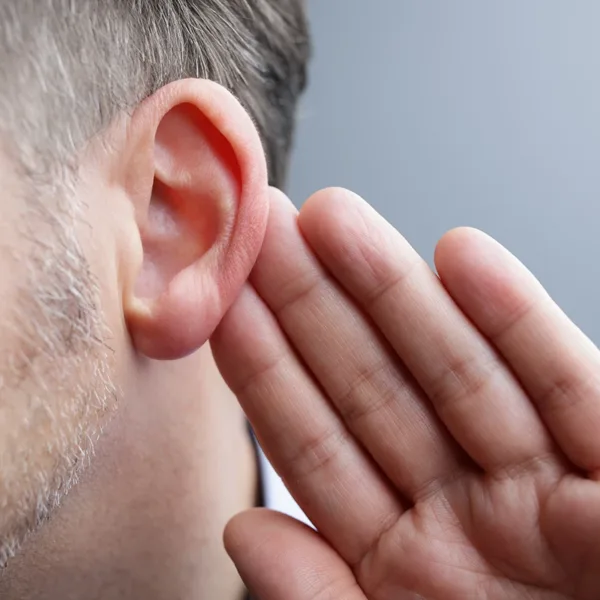
Hearing loss is a common condition that affects 1 in 8 people in the United States1. While it is often associated with aging, hearing loss can also be a symptom of other underlying health conditions. From infections to autoimmune diseases, read on to learn about common medical conditions that can cause hearing loss.
Types of Hearing Loss
Hearing loss can occur for a variety of reasons, and it generally falls into three main categories: conductive, sensorineural, and mixed. In some cases, the type of hearing loss a person has can actually signal a larger health concern happening in the body.
- Sensorineural Hearing Loss (SNHL): the most common type, resulting from damage to the inner ear and/or the auditory nerve. It is commonly caused by aging (presbycusis) or exposure to loud noises (noise-induced hearing loss).
- Conductive Hearing Loss (CHL): caused by a blockage or damage in the middle and/or outer ear, like earwax, fluid buildup, or bone abnormality (e.g. otosclerosis).
- Mixed Hearing Loss (MHL): a combination of sensorineural and conductive hearing loss.
Common Health Conditions That Can Cause Hearing Loss
Hearing loss can sometimes be a symptom of various medical conditions, ranging from localized ear issues to systemic diseases. It is crucial to identify the cause as soon as possible to ensure timely diagnoses and treatment for the hearing loss itself, as well as the underlying health issue.
Below, we list some of the most common medical conditions that can cause hearing loss:
Middle Ear Infections (Otitis Media)
Middle ear infections (Otitis Media) are a common cause of hearing loss. These temporary infections often involve ear pain, trouble hearing, fluid buildup, or a clogged feeling in the ears. Ear infections can have both viral and bacterial causes, including:
- Measles
- Mumps
- Flu
- Common cold
- Strep
- Meningitis
- Borreliosis (Lyme disease)
- And more
Depending on the location and severity, ear infections can lead to sensorineural hearing loss and/or conductive hearing loss. Some infections can begin in the outer ear and spread to the middle ear, causing inflammation and fluid buildup that can interfere with sound processing (CHL). Untreated, persistent, or recurring ear infections can lead to permanent damage and irreversible hearing loss (SNHL).
Excessive Earwax (Cerumen)
Earwax (cerumen) is natural and generally harmless. However, if too much accumulates in the ear canal, it can block sound from reaching the cochlea (the hearing organ), resulting in hearing loss. Prolonged buildup can also lead to damaging ear infections.
In some cases, professional earwax removal by a qualified hearing healthcare specialist can restore hearing.
Diabetes
Diabetes is a chronic condition that affects over 38 million people in the United States2. This condition changes how the body produces or responds to insulin, a hormone necessary for converting glucose (sugar) into energy, and it can also double the likelihood of hearing loss3.
High blood sugar levels can damage blood vessels, including those in the inner ear which are necessary for sound processing. This damage can cause sensorineural hearing loss.
Stroke
A stroke occurs when blood flow to the brain is disrupted, usually caused by a blood clot (ischemic stroke) or a burst blood vessel (hemorrhagic stroke). Depending on the area of the brain affected, a stroke can impair many functions, including hearing.
If the stroke damages the part of the brain responsible for processing sound, permanent hearing loss can result. In fact, stroke patients are at a 71% higher risk of SNHL compared to non-stroke patients4.
Tumors (Acoustic Neuroma)
An acoustic neuroma is a type of non-cancerous tumor that grows in the ear and can affect hearing. Hearing loss is actually the most common symptom of acoustic neuromas, occurring in 90% of patients5.
Having the tumor removed with surgery or radiation may restore hearing. However, ongoing hearing issues are possible even after the tumor has been removed.
High Blood Pressure (Hypertension)
High blood pressure, also known as hypertension, is a condition where the pressure of blood against the walls of your arteries is chronically elevated. Many factors contribute to hypertension, including:
- Kidney or heart disease
- Age
- Diet
- Obesity
- Smoking
- Alcohol
Over time, the extra pressure caused by hypertension can damage blood vessels throughout the body, including those in the ears. Prolonged periods of high blood pressure greatly increase the risk of permanent sensorineural hearing loss6.
Lyme Disease
Lyme disease is a common bacterial infection caused by the bacteria Borrelia burgdorferi. This bacteria is typically spread to people from the bite of an infected tick. Borrelia burgdorferi is the most prevalent bacterial cause of sensorineural hearing loss in the United States7.
Lyme bacteria can infect any part of the body and cause chronic inflammation. This can damage the inner ear and lead to SNHL, as well as frequent ear infections that can further affect hearing.
Medications (Ototoxicity)
Ototoxicity, literally meaning “ear poisoning,” refers to the damaging effect that certain medications can have on the inner ear, resulting in permanent sensorineural hearing loss. There are over 200 known ototoxic medications, some of which include 8:
- Certain antibiotics (aminoglycosides, vancomycin)
- Some antidepressants (sertraline, fluoxetine)
- Chemotherapy drugs (carboplatin, cisplatin)
- NSAIDs (aspirin, ibuprofen, naproxen)
- Quinine-based medications
Ototoxic hearing loss is permanent, but recognizing the warning signs and collaborating with your doctor to manage medications can help minimize the risk of additional damage.
Traumatic Injuries
Traumatic injuries, particularly those involving the head or ears, can lead to hearing loss. This can include falling and hitting your head, blunt force trauma to the face, exposure to extremely loud sounds, and more. Even minor trauma can have long-lasting effects on hearing if not promptly treated.
Other forms of trauma-induced hearing loss include:
- Acoustic trauma: direct exposure to loud sounds like gunfire or explosions, which can cause instant noise-induced hearing loss (NIHL).
- Traumatic brain injury (TBI): head injuries, even without damage to the ear, can cause hearing loss due to brain or auditory nerve damage.
- Barotrauma: injury to the middle and/or inner ear, caused by changes in air pressure.
Hearing loss caused by traumatic injuries can be sensorineural, conductive, or mixed, depending on the injury’s nature. For example, ear bone fractures can cause CHL, while auditory nerve or inner ear damage can cause SNHL.
Schedule a Hearing Exam at an Audibel Clinic Near You
Hearing loss can be a symptom of many underlying conditions. Routine hearing exams are essential for detecting any changes in hearing over time. This ensures timely diagnosis and treatment for both hearing loss and any potential underlying health conditions that may be causing it.
Don’t wait until it’s too late; find an Audibel clinic near you today to protect your hearing and your overall health for the long-term.
References
- Quick statistics about hearing, balance, & dizziness. (2024, March 4). NIDCD. https://www.nidcd.nih.gov/health/statistics/quick-statistics-hearing
- National Diabetes Statistics Report. (2024, May 15). Diabetes. https://www.cdc.gov/diabetes/php/data-research/index.html
- Hearing Loss Is Common in People with Diabetes. (2015, September 20). National Institutes of Health (NIH). https://www.nih.gov/news-events/news-releases/hearing-loss-common-people-diabetes
- Kuo, C.-L., Shiao, A.-S., Wang, S.-J., Chang, W.-P., & Lin, Y.-Y. (2016, September 9). Risk of sudden sensorineural hearing loss in stroke patients. National Institutes of Health (NIH). https://www.ncbi.nlm.nih.gov/pmc/articles/PMC5023925/
- Acoustic neuroma (Vestibular schwannoma). (2023, March 6). Johns Hopkins Medicine. https://www.hopkinsmedicine.org/health/conditions-and-diseases/brain-tumor/vestibular-schwannoma
- Agarwal, S., Mishra, A., Jagade, M., Kasbekar, V., & Nagle, S. K. (2013). Effects of hypertension on hearing. Indian Journal of Otolaryngology and Head & Neck Surgery, 65(S3), 614–618. https://doi.org/10.1007/s12070-013-0630-1
- Sowula, K., Szaleniec, J., Stolcman, K., Ceranowicz, P., Kocoń, S., & Tomik, J. (2021). Association between Sudden Sensorineural Hearing Loss and Lyme Disease. Journal of Clinical Medicine, 10(5), 1130. https://doi.org/10.3390/jcm10051130
- American Speech-Language-Hearing Association. (n.d.). Ototoxic medications (Medication effects). https://www.asha.org/public/hearing/ototoxic-medications/?_gl=1*okrit*_gcl_au*NjEzMDU1MDM2LjE3MjY2NzYzODg.







Have a question or Comment?